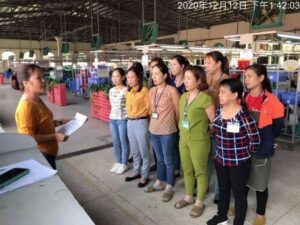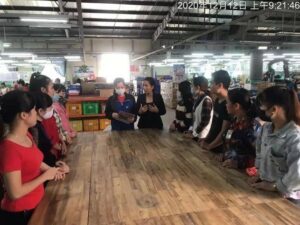Sexual harassment remains one of the most difficult to address issues that workers face in the garment industry, despite positive changes to the labour code. Among the approximately 400 Better Work Vietnam textile, garment and footwear participating factories, female workers account for approximately 79%. Better Work Vietnam has begun to prioritize the issue of sexual harassment to promote a safe and healthy work environment for all employees.
Nguyen Huong Thao has been working in Golden Top Co., Ltd – Lien Dinh, a factory located in Hai Phong province, Vietnam, for over 16 years. She now acts as an HR officer in charge of human resources, occupational health and safety, and factory compliance and has participated in many Better Work training courses.
“I was very interested in Better Work training courses, especially about sexual harassment prevention,” Thao says. “I was able to start implementing an effective communication campaign in my factory shortly after that.” After acquiring knowledge and skills through the training course on sexual harassment prevention at the workplace, Thao proposed to the factory management to build and roll-out an effective plan to boost the employees’ awareness raising of workplace sexual harassment since late 2020 and got approved.
“The ideas started with the establishment of a communicator network, and I trained them so that each member could individually handle the communications activities for their assigned workshops,” she said.

The communicator network includes the focal points of each factory workshop, and they will be in charge of helping the workers to identify, monitor and report on sexual harassment cases if found. The sexual harassment initiative is a “train the trainer” course, in which workers like Thao are able to share their new skills across their teams. To embed the training, participants then practice in their workshops and receive monthly coaching sessions to refine their skills.
“The first few communications sessions were difficult, as we did not have proper equipment, such as a microphone or a speaker when speaking at the workshop,” said Thao “Some of the trainees were not very confident speaking in front of the public or responding to the workers’ questions.” “After the first few sessions, our group sat together, discussed together, and shared feedback with each other.”

After nearly six months of implementation, the trainings have now covered nearly all of the factory’s workers. The initial training is bearing fruit. To date, Thao and her communicator group not only take advantage of direct workshop training but also of other communications channels such as Zalo, a popular smartphone app, and Facebook, to further raise awareness about workplace sexual harassment. Other communications materials, such as bulletin boards, posters, flyers and guiding documents deliver the contents of the session in the workshop and reinforce reporting methods.
Thao has been encouraged by the feedback from the workers she has trained. “I was not very confident to deliver the first few sessions at the workshop, but Thao encouraged me a lot. Now everything has been smoother and leading the trainings have become part of my routine at work,” says Hue Pham, a worker and communicator network member for Lien Dinh factory.
In 2021, other factories belonging to Golden Top Co., Ltd will embed some of the methods that have been successfully implemented in Lien Dinh factory, to raise the awareness of their workers of the continuing issue of sexual harassment. Led by their own workforce, train the trainer workshops have the potential to impact even pervasive problems.